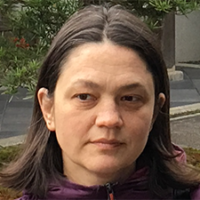Topic outline
Welcome address
09:30, Monday, 21st March - Welcome address
Welcome address - part 1
Welcome address - part 2
Robot Autonomy and the Unknown Environment
Dan Novischi: Robot Autonomy and the Unknown Environment
11:30, Monday, 21st March | 16:30, Wednesday, 23rd March | 16:30, Thursday 24th March
 Dan is lecturer at the University Politehnica of Bucharest,
where he received his PhD in Computer Science that investigated self-organization and self-coordination in robotic swarm systems. His main research focus is on autonomous robotics, multi-robot systems and machine learning. Dan is also a member of
Artificial Intelligence and Multi-Agent Systems Laboratory at University Politehnica of Bucharest, where he is actively involved national and international projects focused on the research and development of self-driving cars, swarm robotics, ambient
intelligence, smart environments and assistive robotics.
Dan is lecturer at the University Politehnica of Bucharest,
where he received his PhD in Computer Science that investigated self-organization and self-coordination in robotic swarm systems. His main research focus is on autonomous robotics, multi-robot systems and machine learning. Dan is also a member of
Artificial Intelligence and Multi-Agent Systems Laboratory at University Politehnica of Bucharest, where he is actively involved national and international projects focused on the research and development of self-driving cars, swarm robotics, ambient
intelligence, smart environments and assistive robotics. March 21 - The SLAM Problem.pdf
March 21 - The SLAM Problem.pdf
Dan Novischi: The SLAM Problem, Part 1
Dan Novischi: The SLAM Problem, Part 2
Dan Novischi: The SLAM Problem, Part 3
Robotic Swarms: the Quest for Safety
14:30, Monday, 21st March - Xavier Urbain: Robotic Swarms: the Quest for Safety
 Xavier Urbain is full professor at Université Claude Bernard, Lyon,
France. He received his PhD from University Paris-Sud XI in 2001, as
well as his Habilitation in 2010. He is a specialist of automated
deduction and certified proof, in particular aimed at exhibiting
properties of programs. His research interests include formal
guarantees for distributed algorithms, notably in the context of
mobile robots.
Xavier Urbain is full professor at Université Claude Bernard, Lyon,
France. He received his PhD from University Paris-Sud XI in 2001, as
well as his Habilitation in 2010. He is a specialist of automated
deduction and certified proof, in particular aimed at exhibiting
properties of programs. His research interests include formal
guarantees for distributed algorithms, notably in the context of
mobile robots.Xavier Urbain: Robotic Swarms: the Quest for Safety
Improving human-robot interaction with AI - practical example (with Pepper and other robots)
16:30, Monday, 21st March - Amélie Cordier: Improving human-robot interaction with AI - practical example (with Pepper and other robots)
 Amélie
is Associate Professor at Université de Lyon. She defended her PhD in
Artificial Intelligence in 2008 and is still an active researcher in
that field. She is also president and co-founder of Lyon-iS-Ai, a French
NPO aiming at making Artificial Intelligence understandable by the
general public.
Amélie
is Associate Professor at Université de Lyon. She defended her PhD in
Artificial Intelligence in 2008 and is still an active researcher in
that field. She is also president and co-founder of Lyon-iS-Ai, a French
NPO aiming at making Artificial Intelligence understandable by the
general public.Amélie Cordier: Improving human-robot interaction with AI - practical example
Privacy by design in embedded systems
09:30, Tuesday, 22nd March - Harald Kosch: Privacy by design in embedded systems
 Harald studied computer science with a minor in electrical engineering
at the Technical University of Munich. There he wrote his intermediate diploma. He did Maîtrise and DEA in computer science at the Université Claude Bernard in Lyon. From 2009 to 2011 he was Dean of the Faculty of Computer Science and Mathematics
(FIM) in Passau and thereby a member of the extended university management. Since December 2016, he has been Vice President of the University of Passau.
Harald studied computer science with a minor in electrical engineering
at the Technical University of Munich. There he wrote his intermediate diploma. He did Maîtrise and DEA in computer science at the Université Claude Bernard in Lyon. From 2009 to 2011 he was Dean of the Faculty of Computer Science and Mathematics
(FIM) in Passau and thereby a member of the extended university management. Since December 2016, he has been Vice President of the University of Passau.Harald Kosch: Privacy by design in embedded systems
Security, Privacy and Ethical issues for next-gen Automotive
11:30, Tuesday, 22nd March - Ashish Ashutosh: Security, Privacy and Ethical issues for next-gen Automotive
 Ashish is currently a cotutelle PhD student between the
University of Passau and INSA Lyon, researching in the domain of security and privacy for the automotive domain. More specifically, his area of focus is access control and data privacy, especially in a connected vehicle ecosystem. Ashish strives to
learn on a daily basis and have an open mind for rational discussions.
Ashish is currently a cotutelle PhD student between the
University of Passau and INSA Lyon, researching in the domain of security and privacy for the automotive domain. More specifically, his area of focus is access control and data privacy, especially in a connected vehicle ecosystem. Ashish strives to
learn on a daily basis and have an open mind for rational discussions. Security, Privacy and Ethical issues for next-gen Automotive
Security, Privacy and Ethical issues for next-gen AutomotiveAshish Ashutosh: Security, Privacy and Ethical issues for next-gen Automotive
Social Robotics - Challenges and Applications
14:30, Tuesday, 22nd March - Alexandru Sorici: Social Robotics: Challenges and Applications
 Alexandru
SORICI is an assistant professor and a scientific researcher at the
Faculty of Automatic Control and Computers of University Politehnica of
Bucharest (UPB). He holds B. Sc., M. Sc. and PhD degrees in Computer
Science from UPB, as well as a PhD degree in Informatics from the École
Nationale Supérieure des Mines de Saint-Étienne, following a
joint-degree thesis, defended in September 2015.
Alexandru
SORICI is an assistant professor and a scientific researcher at the
Faculty of Automatic Control and Computers of University Politehnica of
Bucharest (UPB). He holds B. Sc., M. Sc. and PhD degrees in Computer
Science from UPB, as well as a PhD degree in Informatics from the École
Nationale Supérieure des Mines de Saint-Étienne, following a
joint-degree thesis, defended in September 2015.Alexandru’s research activity and interests span the domains of Ambient Intelligence (AmI), Multi-Agent Systems (MAS), Knowledge Representation applied to Context Management and Machine Learning applied to Activity Recognition. More recently the interest into AmI expanded to activities and projects in Active and Assisted Living (AAL), Activity Recognition and Social Robotics.
Link too Google Slides: https://docs.google.com/presentation/d/181VtuH_vRlBjzpkOMrcloUvMsTLKu8xEP4aakZ8QT5EAlexandru Sorici: Social Robotics Challenges and Applications
Intelligent Automation at Estee Lauder Companies
16:30, Tuesday, 22nd March - Garima Yadav, Andreea Raica, Corina Agarici: Intelligent Automation at Estee Lauder Companies
 Garima Yadav is the Business Analysis Discipline Lead at the Estée
Lauder Companies. She is focused on creating a people-centric culture
while growing the operations of the new Bucharest Digital Technology
Center. She also oversees the recruitment process and career development
for talent in the Business Analysis discipline. Garima brings over
5 years of global experience as a business analyst and product manager
building digital beauty experiences. Garima holds a Bachelor of Science
in Biochemistry and Economics, as well as Master of Business
Administration in Finance with a concentration in data analytics from
Stony Brook University in the US. https://www.linkedin.com/in/garimayadav/
Garima Yadav is the Business Analysis Discipline Lead at the Estée
Lauder Companies. She is focused on creating a people-centric culture
while growing the operations of the new Bucharest Digital Technology
Center. She also oversees the recruitment process and career development
for talent in the Business Analysis discipline. Garima brings over
5 years of global experience as a business analyst and product manager
building digital beauty experiences. Garima holds a Bachelor of Science
in Biochemistry and Economics, as well as Master of Business
Administration in Finance with a concentration in data analytics from
Stony Brook University in the US. https://www.linkedin.com/in/garimayadav/
Andrea Raica is the Senior Lead Business Analyst, Intelligent Automation. She is responsible for driving the Intelligent Automation Community of Automation program at ELC and networking with contributors to ensure adherence to Automation Hub guidelines. She maintains project tracking across portfolios to provide project benefit quantification and up-to-date details of financial aspects of project delivery. Andreea has 4 of years of experience in the field of Robotic Process Automation. She worked on several international RPA project implementations as a Business Analyst and RPA Consultant for multinational companies in industries such as insurance, oil and gas, chemical and pharmaceuticals. Andreea holds both a Master and a Bachelor degree in Entrepreneurship and Business Administration from the Bucharest University of Economic Studies in Romania. https://www.linkedin.com/in/andreea-mihaela-raica/
Garima Yadav, Andreea Raica: Intelligent Automation at Estee Lauder Companies
Elderly Assistance and Monitoring Using a Robotic Platform
09:30, Wednesday, 23rd March - Irina Mocanu: Elderly Assistance and Monitoring Using a Robotic Platform
 Irina Georgiana Mocanu is Professor Department of
Computer Science and Engineering of UPB and member of the AIMAS Laboratory. Her research interests are in computer vision, machine learning, computer games and applications of ambient intelligence. She has published over 100 research papers in
journals and international conferences. She coordinated the national project Mobile@Old - Assistant for the ageing based on mobility patterns and she led the AAL project IONIS - NITICSplus - Indoor and Outdoor Solution for Dementia. Now she
is leading the UPB team in the EU AAL project INCARE Integrated Solution for Innovative Elderly Care. Also, she is MC Member for Cost Action CA19121 - Network on Privacy-Aware Audio- and Video-Based Applications for Active and Assisted Living
and MC Substitute for Cost Action CA19136 – International Interdisciplinary Network on Smart Healthy Age-friendly Environments.
Irina Georgiana Mocanu is Professor Department of
Computer Science and Engineering of UPB and member of the AIMAS Laboratory. Her research interests are in computer vision, machine learning, computer games and applications of ambient intelligence. She has published over 100 research papers in
journals and international conferences. She coordinated the national project Mobile@Old - Assistant for the ageing based on mobility patterns and she led the AAL project IONIS - NITICSplus - Indoor and Outdoor Solution for Dementia. Now she
is leading the UPB team in the EU AAL project INCARE Integrated Solution for Innovative Elderly Care. Also, she is MC Member for Cost Action CA19121 - Network on Privacy-Aware Audio- and Video-Based Applications for Active and Assisted Living
and MC Substitute for Cost Action CA19136 – International Interdisciplinary Network on Smart Healthy Age-friendly Environments. Irina Mocanu - Elderly Assistance and Monitoring Using a Robotic Platform
Irina Mocanu - Elderly Assistance and Monitoring Using a Robotic PlatformIrina Mocanu: Elderly Assistance and Monitoring Using a Robotic Platform
Assessing risks in a data science project
11:30, Wednesday, 23rd March - Vasile-Marian Scuturici: Assessing risks in a data science project
 Vasile-Marian Scuturici is a professor at INSA Lyon and Laboratoire d'Informatique en Images et Systèmes d'Information (LIRIS - CNRS/INSA de Lyon/Université Claude Bernard Lyon 1), since 2022 (and he has been an associate professor since 2004). He defended a thesis in computer networks at the Lumière Lyon 2 University in 2001, then passed an habilitation (HDR) in 2013 at INSA Lyon. Marian Scuturici is member of the LIRIS Databases team since 2010, and he is in charge with laboratory's partnership relations since 2018.
Vasile-Marian Scuturici is a professor at INSA Lyon and Laboratoire d'Informatique en Images et Systèmes d'Information (LIRIS - CNRS/INSA de Lyon/Université Claude Bernard Lyon 1), since 2022 (and he has been an associate professor since 2004). He defended a thesis in computer networks at the Lumière Lyon 2 University in 2001, then passed an habilitation (HDR) in 2013 at INSA Lyon. Marian Scuturici is member of the LIRIS Databases team since 2010, and he is in charge with laboratory's partnership relations since 2018.His current research focuses on data science, in particular the use of declarative methods for interactive data exploration. He lends special attention to the mechanisms for providing scientific solutions to complex real-world problems.
Vasile-Marian Scuturici: Assessing risks in a data science project
Critical raw materials, conflict minerals and shortfall of elements used in electronic and electrical devices
09:30, Thursday, 24th March - Daniela Nastac: Critical raw materials, conflict minerals and shortfall of elements used in electronic and electrical devices. An approach taking into account recycling and recovery of materials
 Daniela
Cristina Nastac received the Ph.D. degree in chemical engineering from
the University Politehnica of Bucharest, in 1994. Till the end of 2017
she was with CEPROCIM S.A. a joint stock company with private capital in
the field of binders research and various activities of testing and
technical analyses. Since 2018 she has been with the IT Center of
Science and Technology where she holds a position of senior researcher
in materials engineering. Her current research topics include valorizing
of wastes as alternative materials in various industries, analyzing the
technological impact of alternative materials to the properties of the
final product, development of investigation methods depending on
research projects aims. She is currently involved in research projects
on nano fiber production for pharmaceutical and medical domain via
electrospinning and decontamination of heritage products by using cold
plasma. She has acquired a broad range of technical and project
management skills while leading research projects gained in the national
competitions and technical projects in private industry.
Daniela
Cristina Nastac received the Ph.D. degree in chemical engineering from
the University Politehnica of Bucharest, in 1994. Till the end of 2017
she was with CEPROCIM S.A. a joint stock company with private capital in
the field of binders research and various activities of testing and
technical analyses. Since 2018 she has been with the IT Center of
Science and Technology where she holds a position of senior researcher
in materials engineering. Her current research topics include valorizing
of wastes as alternative materials in various industries, analyzing the
technological impact of alternative materials to the properties of the
final product, development of investigation methods depending on
research projects aims. She is currently involved in research projects
on nano fiber production for pharmaceutical and medical domain via
electrospinning and decontamination of heritage products by using cold
plasma. She has acquired a broad range of technical and project
management skills while leading research projects gained in the national
competitions and technical projects in private industry.Daniela Nastac: Critical raw materials, conflict minerals and shortfall of elements used in electronic and electrical devices
From service to assistive robotics with EARL-based system engineering
11:30, Thursday, 24th March - Tomek Winiarski: From service to assistive robotics with EARL-based system engineering
 Tomasz
Winiarski - M.Sc./Eng. (2002) and PhD (2009) in control and robotics
from Warsaw University of Technology (WUT) and assistant professor of
WUT. He is a member of the Robotics Group as the head of the Robotics
Laboratory in the Institute of Control and Computation Engineering
(ICCE), Faculty of Electronics and Information Technology (FEIT). He is
working on the modelling and design of robots and on programming methods
for robot control systems. His research targets service and social
robots and didactic robotic platforms. His personal experience concerns
the development and modelling of robotic frameworks, manipulator
position-force and impedance control and safety in robotic research.
Currently, he is the head of the WUT group in AAL -- INCARE project
"Integrated Solution for Innovative Elderly Care".
Tomasz
Winiarski - M.Sc./Eng. (2002) and PhD (2009) in control and robotics
from Warsaw University of Technology (WUT) and assistant professor of
WUT. He is a member of the Robotics Group as the head of the Robotics
Laboratory in the Institute of Control and Computation Engineering
(ICCE), Faculty of Electronics and Information Technology (FEIT). He is
working on the modelling and design of robots and on programming methods
for robot control systems. His research targets service and social
robots and didactic robotic platforms. His personal experience concerns
the development and modelling of robotic frameworks, manipulator
position-force and impedance control and safety in robotic research.
Currently, he is the head of the WUT group in AAL -- INCARE project
"Integrated Solution for Innovative Elderly Care".Tomek Winiarski: From service to assistive robotics with EARL-based system engineering
Smart Health Records: How can we do better?
14:30, Thursday, 24th March - Paolo Ceravolo: Smart Health Records: How can we do better?
 Paolo Ceravolo is an Associate Professor at the Computer Science Department of the University of Milan. His research interests include Data Representation and Integration, Process Monitoring, Process Mining, Empirical Software Engineering, Machine Learning. On these topics, he has published more than 150 papers. Since 2014 he is chair and subsequently vice-chair of the IFIP 2.6 Working Group on Database. He is a member or chair of several program committees in international conferences. As a data scientist, he was involved in several internationally funded research projects and innovative startups.
Paolo Ceravolo is an Associate Professor at the Computer Science Department of the University of Milan. His research interests include Data Representation and Integration, Process Monitoring, Process Mining, Empirical Software Engineering, Machine Learning. On these topics, he has published more than 150 papers. Since 2014 he is chair and subsequently vice-chair of the IFIP 2.6 Working Group on Database. He is a member or chair of several program committees in international conferences. As a data scientist, he was involved in several internationally funded research projects and innovative startups.Paolo Ceravolo: Smart Health Records How can we do better
Ethical implications of AI use and user-centered design
09:30, Friday, 25th March - Dorin Stanciu: Ethical implications of AI use and user-centered design
 Dorin is a researcher and teacher of psychology. He currently teaches Psychology and Human Factors, as associate professor at the Technical University of Cluj-Napoca, and is affiliated with the Walden University as doctoral supervisor and methodologist.
Dorin is a researcher and teacher of psychology. He currently teaches Psychology and Human Factors, as associate professor at the Technical University of Cluj-Napoca, and is affiliated with the Walden University as doctoral supervisor and methodologist.
He loves Statistics and holds a somewhat strange belief that Psychology is half-way Mathematics or it should be. He also spends most of his time trying out various NLP and other machine learning models, because he is convinced that ML will bring a new dawn to how we do science and construe the world.
Dorin considers himself fortunate to have been co-opted as a member of the CITST family, and given abundant chances to work with them. During his almost decade long collaboration with CITST, Dorin worked on several international projects that involved the use of assistive robots and related technologies.Dorin Stanciu: Ethical implications of AI use and user-centered design
Final presentations
11:30, Friday, 25th March - Final presentations
Team Orange: Are robots better fit for the future than humans?
Team Red: Reasoning about ethical issues in designing assisted living robots
Team Purple: Can one be a fan of a robot football team
Team Green - Robotic Revolution
Team Blue: Can we let robots autonomously make important decisions which concern humans
Shared media
Uploading photos:
- Make a zip archive with the photos
- Go to this link
- Press Turn editing on (in the header of the page, to the right)
- At the bottom of the page, press Add items in bulk
- Drag-and-drop the archive to the designated space
- Press Submit

